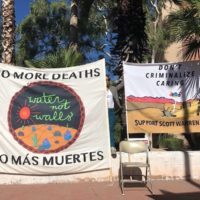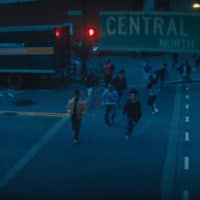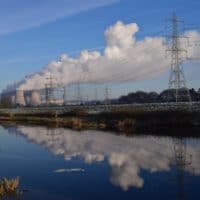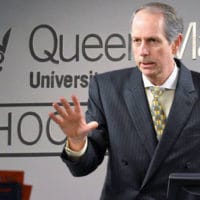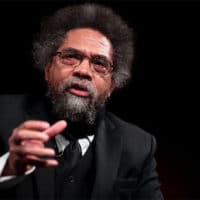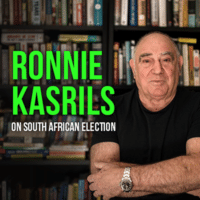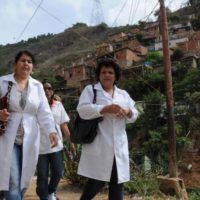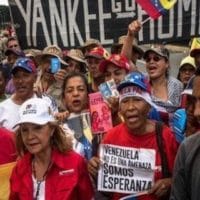-
U.S. activist faces federal charges for providing aid to migrants
Scott Warren was arrested in 2018 for allegedly having “harbored” two fatally weakened undocumented migrants in a facility run by No More Deaths
-
Big lies
Benjamin Carter Hett on what we can learn from Hitler’s rise to power
-
Dossier 17: Venezuela and hybrid wars in Latin America
Dossier no. 17 reflects on the hybrid war unleashed against Venezuela. We document the repertoire of tactics, but also the motives behind them. We are interested not only in the recent attack on Venezuela, but in the similarities between this attack and others in Latin America over the past decades.
-
Watching ‘When They See Us’, as a white woman
In order to really see these boys and their families white people have to see themselves as participatory in racism. So to see their innocence “we” must see our own part, our guilt, our responsibility in the newest forms of slavery, no longer chattel, but carceral.
-
Regime change through social media
“If you can actually influence how people think, through social media, then you can have a lot more control” of their political behavior, said Valentine.
-
Working Group on the ‘Anthropocene’
Following guidance from the Subcommission on Quaternary Stratigraphy and the International Commission on Stratigraphy, the AWG have completed a binding vote to affirm some of the key questions that were voted on and agreed at the IGC Cape Town meeting in 2016.
-
Guaido “hires” an economic hitman (Venezuelan debt)
Washington’s actions in August 2017 drove Venezuela out of the international financial system and disabled the country from issuing debt for purposes of refinancing the debt acquired in previous years, as well as using foreign banks.
-
How not to measure inequality
When we look at inequality from the perspective of the poor – using the theory of increasing egregiousness – it becomes clear that the relative metric is inappropriate as a tool for assessing distribution. Certainly if our objective is to end poverty, this is the conclusion we must draw, as an additional dollar going needlessly to the rich could have been used to reduce poverty, and yet was not.
-
Speaking the truth
Cornel West and Deborah Chasman discuss the disproportionately white publishing world, the responsibilities and burdens of public life, and the predicament of black intellectuals today.
-
Ronnie Kasrils on South African election
As the curate said, assessing a none-too-fresh boiled egg at breakfast: ‘It was good in parts.’
-
Media stenography turns beheaded Saudi protesters into ‘terrorism’
All three outlets also added gratuitous details about the attack in Sri Lanka and/or other ISIS-related attacks–attacks that there’s no suggestion any of the defendants were connected to. In fact, most of these defendants were arrested before ISIS existed. And a majority of those killed, being Shiites, would be viewed by ISIS as heretics.
-
We are the shadow-ghosts, creeping back as the camp fires burn low
Professor Sandra Díaz, who teaches in Argentina’s National University of Cordoba and is the co-chair of the IPBES report, said that although bio-diversity and eco-diversity are ‘declining fast’, ‘we still have the means to ensure a sustainable future for people and the planet’.
-
Colored Property & State Debt with David Freund
In this episode, we talk with David Freund, associate professor of history at the University of Maryland. David is the author of Colored Property: State Policy and White Racial Politics in Suburban America, an award-winning book that tracks how the language of racial exclusion was re-coded in terms of markets, property, and citizenship in the post-World War II era.
-
Cuban “troops” saving lives in Venezuela
Cubans are truly committed to the principle of sovereignty, we are protective of our independence, and we would never do to others what we would not allow to be done to ourselves.
-
Trump continues Obama’s war on whistleblowers, arrests another alleged Intercept source
This outrageous explosion of watchlisting — of monitoring people and racking and stacking them on lists, assigning them numbers, assigning them ‘baseball cards,’ assigning them death sentences without notice, on a worldwide battlefield — it was, from the very first instance, wrong.
-
We have stolen his land. Now we must steal his limb
When the late South African artist Tito Zungu wanted to depict the world of the migrant labourer, he settled on the envelope. It was by infrequent letters that the migrant would be able to be in touch with family – letters dictated to professional letter writers at one end, which would be read out by professional letter readers at the other.
-
The Atlantic illustrates everything that’s wrong with media coverage of Venezuela sanctions
“Trump’s Venezuela Policy: Slow Suffocation,” an Atlantic report (4/17/19) by Uri Friedman and Kathy Gilsinan, passed up a rich opportunity to expose the humanitarian pretexts for economic intervention, and instead exhibited the worst tendencies of corporate media coverage of U.S. policy in Latin Ame
-
“Color” revolution USA
The U.S. press has routinely abused, disrespected and lied about Black, brown and yellow peoples and their heads of state, and now subjects its own top political figures to the same treatment.
-
Washington’s hybrid war on Venezuela – a very 21st-century attempt at regime change
Rather than carry out conventional war, over recent months U.S. officials have sought to promote internal divisions, sabotage, and economic collapse within Venezuela. Here’s the full story of Washington’s hybrid war on the country.
-
Tricontinental Briefing No 1: Canadian mining companies
Introduction Of the world’s mining companies, 60% are headquartered in Canada. In February 2019, 216 companies were listed on the Toronto Stock Exchange (TSX) and 961 companies were listed on the TSX-Venture Exchange (TSXV). Mining accounts for 53% of the composite index. This kind of industry dominance suggests that investors trust the stability of the […]

